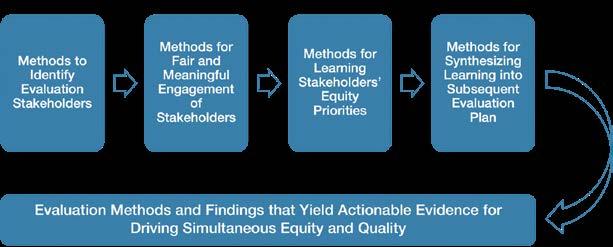
2 minute read
Performance Evaluation: A Focus on Equity
The Nebraska Early Childhood Strategic Plan integrates results through process-oriented inquiry. Ongoing conversations with collaborators and stakeholders include discussions about what success looks like and how changes can be measured. The intent is to help ensure that Nebraska has the capacity to evaluate progress, make data-informed decisions about how to improve early childhood services, and support sustainable change at the community and state levels. Information gathered from stakeholders is shared with the performance evaluation team—a cross-campus partnership that is led by the Institute with colleagues from the Munroe-Meyer Institute at the University of Nebraska Medical Center.
Funded as part of the Nebraska Preschool Development Grant Birth–Five initiative, the performance evaluation team collaborates with state agencies and other partners to address two goals:
Advertisement
• Progress evaluation. Evaluate the degree to which projects of the Preschool Development Grant are advancing the goals of the Nebraska Early Childhood Strategic Plan
• Capacity building. Build capacity at state and local levels to evaluate early childhood investments using an equitable systems lens.
To address these goals, the Institute convened an Evaluation Network Team composed of statewide evaluation stakeholders, defined as program and evaluation professionals for early childhood efforts. Over the course of two years, from fall 2020 to fall 2022, the team met online 13 times, with 25–55 stakeholders attending each meeting. Stakeholders from more than 20 state partners and agencies participated. Organizations included Nebraska Children and Families Foundation, Nebraska Department of Education, Nebraska Department of Health and Human Services, Nebraska Early Childhood Collaborative, Learning Community of Douglas and Sarpy Counties, Sherwood Foundation, MunroeMeyer Institute, the four University of Nebraska campuses, Voices for Children in Nebraska, Nebraska Educational Service Units, First Five Nebraska, Omaha Educare, and the Buffett Early Childhood Fund.
Together, these partners developed principles for systemic evaluation design and practice based on the values defined in the Nebraska Early Childhood Strategic Plan. These principles are intended to inform evaluation design and implementation, with a focus on addressing quality and equity simultaneously.
In small group activities and discussion at the Evaluation Network Team meetings, stakeholders helped to co-create the “Equity Action Agenda,” a tool designed to help evaluators embed equity into their projects from the outset, and a way to propose this type of evaluation to funders, state agencies, and other stakeholders. The Equity Action Agenda assumes that evaluators and communities undertake a six-month process of evaluation
Planning Using Methods That Explore Core Questions Underlying Equitable Evaluation
The core questions are organized around four elements of the agenda: stakeholder identification, meaningful and fair engagement, equity priorities, and synthesis (Figure 15).
The Equity Action Agenda continues to be refined and operationalized to ensure that families and diverse stakeholders are fully included in the planning of programs and their evaluation. Team members from the Munroe-Meyer Institute developed a pilot project using the agenda in partnership with the Little Priest Tribal College in Winnebago, Nebraska. Ongoing meetings of the Evaluation Network Team are focused on “Progress Walks,” in which community members and stakeholders involved in evaluation, needs assessment, and strategic planning meet to review available data and consider strengths and needs in the context of equitable evaluation for early childhood programs and services.






